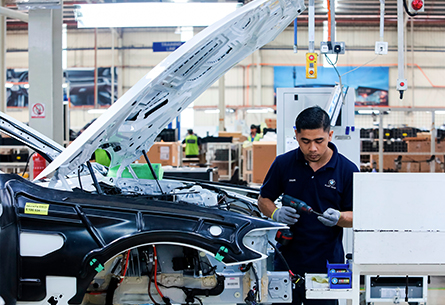With the leadership of the Ministry of Trade, Industry and Tourism, and Proexport, we designed a strategy that is the result of a work that began five years ago. This effort was aimed at developing the productive sector to the opening of trade borders. Three phases were developed: Strengthening, Expansion and Innovation. The purpose of this effort is to provide guidance to entrepreneurs throughout the country who are seeking international business opportunities.
Colombian products with 0% tariff
- 99% of Colombian qualifying industrial and textile goods will become duty free upon the implementation of the FTA.
- 89% of Colombian agricultural goods will become duty free upon implementation of the FTA.
- Duties on many other tariff lines will be phased out over a period of up to 15 years, with some agricultural tariff rate quotas. While Colombia is expected to fill its new sugar TRQ, the FTA is likely to have a minor effect on U.S. imports and production of sugar and sugar containing products.

Key facts
The Colombia- U.S. FTA promotes trade in goods by eliminating tariff barriers, and by promoting the harmonization of technical regulations between both parties. As a result, FTA supports economic growth in both countries.
The FTA supports American jobs and improves American competitiveness since many American businesses use imports under this program as inputs to manufacture goods in the United States.
It is expected that the agreement will be effective in the second half of 2012, once Colombia accomplish all the agreement laws, regulations and policies. USTR is helping to accomplish these requirements as quickly as possible.
Colombia’s government is ensuring labor laws by promoting more protection rights for workers, to please and accomplish the strategic goals of the bilateral Labor Action Plan.
The USTR General Counsel, Tim Reif said that the FTA with Colombia is “well on the road” and is likely to be the next FTA to see implementation -GBD event on the pending FTAs.
United States Trade Representative Ron Kirk said “USTR has already started the work necessary to bring these agreements into force as soon as possible”- September 2011.
Colombia asked assistance in its labor to upgrade its workers rights from both the International Labor Organization and U.S. government. Mr. Kirk said:“It feels like they are absolutely meeting both the letter and spirit of what we asked them to do”.
Colombian products with 0% tariff
ATPDEA
The approval of the FTA extends the Andean Trade Promotion and Drug Eradication Act, ATPDEA, which was renewed until July 2013. The tariff preferences that many Colombian products have had shall be maintained with the FTA and therefore, sectors such as flowers, apparel, tobacco, cocoa, plastics and leather manufacturing, among others, shall be benefited.
In fact, both the ATPDEA preferences as well as the others that were agreed upon, shall be maintained over time, given that their persistence shall not be subject to unilateral U.S. Government and Congress decisions.
Agreements texts
The FTA is an agreement that generates opportunities for all Colombians, as it contributes to the creation of quality jobs and the improvement of the national economy’s performance. It benefits the exports sector, which will be able to sell its products and services under favorable conditions in the U.S. market.
The subjects that were negotiated were market access, in its two aspects (industrial and agricultural), intellectual property, investment regime, Government acquisitions, conflict resolution, competency, e-trade, services, environment and labor, among others.
The text of the agreement is embodied in one preamble and 23 chapters. The chapters cover aspects that reflect the general agreed-upon disciplines, many of which are common in multilateral and bilateral negotiations, and incorporate particular elements obtained by Colombia as well as by the United States in the negotiation.
For more details on the agreement, visit the Ministry of Trade, Industry and Tourism website at: http://www.tlc.gov.co/
FAQs about TLC
Along with the necessary legal standards that support the FTA, we have been working on several fronts so that Colombian companies gain in productivity, and that the products and services we offer can compete on equal terms. One of the fronts we are working on is to obtain competitive regulation for Colombia. That is, that our standards do not become an obstacle to business growth. For example, in partnership with the private sector, and the different regions, we have identified 70 regulations that hamper the competitiveness of businesses, which we now intend to remove.
The Ministry of Trade, Industry and Tourism along with Proexport are leading a series of strategies for the expansion of more businesses, or to open new markets there. As such, we have designed various seminars and business rounds for entrepreneurs from both countries, in order to share their business opportunities, learn access conditions, and requirements of each market.
For 2012, we have over 150 events scheduled in 32 provinces and in all 50 US states. With these events, we expect to reach more than 1,500 Colombian exporters and 1,300 U.S. buyers. We are also going to secure more than 15,000 business meetings. Additionally, we plan to further the participation of exporters in 35 specialized international fairs in the US.
That is clear. And that is why, from the standpoint of export promotion, tourism and investment, Proexport is working hard on disclosing the different opportunities that will be available (two-way) to both Colombian and US entrepreneurs. So, we are conducting an extensive program of promotional events that allows closer ties between buyers and sellers, investors and travelers from both countries.
Proexport identifies entrepreneurs and businesses in need to strengthen their knowledge on issues related to certification, quality standards, legal issues, phytosanitary and customs
volumes. For this, ten international experts on specialized topics of access to US markets will provide technical assistance in sectors such as agribusiness, manufacturing and clothing.
Of course. There will be experts that will strategically work on overcoming obstacles to the export supply in this area. Also, there will be training provided for those seeking quality certifications that will promote a more competitive offer. The strategy: 18 investigations of niche or new products to empower the current export supply.
For sure. The Colombian economy is going through one of its best moments in recent years, which is a very good situation to materialize this initiative. Also, remember that President Juan Manuel Santos is committed to advancing the implementation of a comprehensive policy to generate wealth for all Colombians, and trade agreements contribute to this goal from different angles: they invigorate trade and production, attract foreign investment, and stimulate tourism.
This is a key point on which there are positive expectations, not only by the government, but by the private sector: 500 thousand new jobs are expected to be created. The implementation of this FTA will mean a drop of 1 point in the unemployment rate, and 2 points in the informal employment rate of the country. These figures can be achieved with more foreign investment, or improvement in the supply chain. Let us remember that the great generation of employment in modern economies comes from the service industries and commerce, which will be the sectors to be benefiting the most with the FTA.
We don’t have an answer to this question as the projections that are available come from entities and institutions outside the Ministry, and the studies do not define regional estimates, only global ones.







